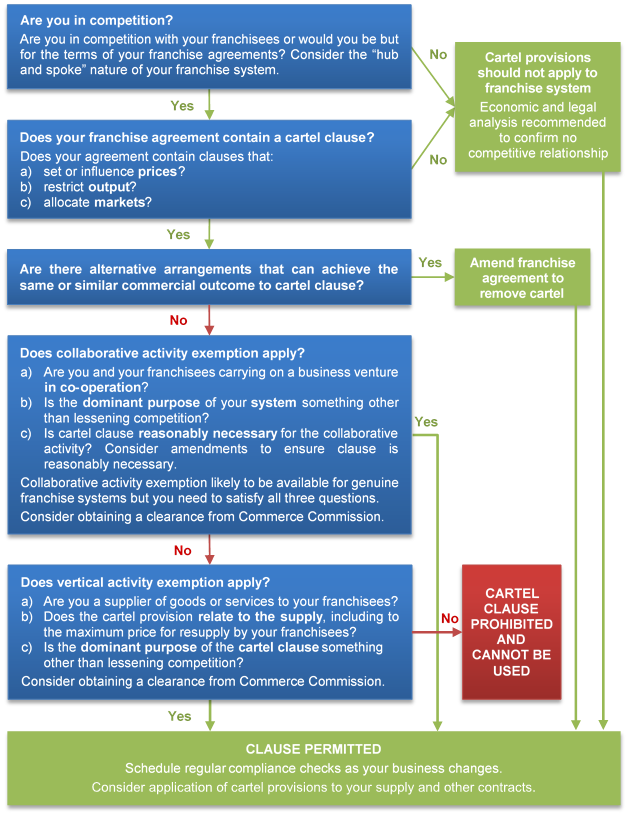 Introduction Introduction
In a rush before the last sitting day before the 2017 election, Parliament passed the “cartel” changes to the Commerce Act. If your franchise system is not already prepared then you need to act now.
This article discusses whether your franchise system is affected, summarises the “cartel” changes and discusses what franchisors need to do.
Is your franchise system affected?
The amendments to the Commerce Act will affect many New Zealand businesses including many suppliers, resellers, franchisors and franchisees. The cartel rules do not apply any special treatment to franchises - franchisors and franchisees are treated as separate businesses.
While you may not think of your franchise business as involving a ‘cartel’, or that you as a franchisor are in competition with your franchisees (being the two triggers for the cartel changes to apply), most franchise agreements will contain a cartel provision of some sort. We suggest that unless you can show otherwise, you should assume that a competitive relationship exists, either between you and your franchisees, or between your franchisees.
A franchisor or one of its related companies is likely to compete with one or more of its franchisees at some point and, if not, most franchise systems will be considered competitors of their franchisees by way of the "hub and spoke" nature of franchise systems. Under the “hub and spoke” nature of most franchise systems, franchisees have identical franchise agreements (other than for updates over time) containing cartel clauses. Franchisees are likely to have a genuine expectation that the franchisor (as the hub) will enforce those agreements against other franchisees who do not comply with the cartel clause - for example by trading in another franchisee’s territory.
This a potentially complex area of law and economics for you to work through!
End of a long journey for the Bill
Readers of our cartel updates will recall that there have been considerable delays in the passage of the Commerce (Cartels and Other Matters) Amendment Bill (Bill). The Bill was introduced in 2011. The Bill originally sought to criminalise cartel conduct (among other changes). Following extensive lobbying this was dropped due to the perceived chilling effect on pro-competitive behaviour and a report from Treasury that the civil cartel regime worked well. The Bill, as finally passed under some haste before the election, still brings significant changes to New Zealand competition law.
Significant changes to competition law
The Bill received royal assent on 14 August 2017 and has now become law. The Bill brings changes to the “cartel provisions” of the Commerce Act 1986 (Commerce Act). Key changes to the Commerce Act include:
It is now unlawful for a contract or other business arrangement to include one of these cartel provisions unless one of the exemptions apply. There are significant penalties for breach of the cartel restrictions.
Of the changes to the Commerce Act, these new restrictions (“restricting output” and “market allocating”) will have the most far reaching impact on businesses.
-
Vertical supply contract exemption: A new exemption for cartel provisions that are included in vertical supply contracts (where certain requirements are met).
-
International liner shipping exemption: A new exemption for international liner shipping from the
prohibitions against anti-competitive agreements and cartels.
What is a cartel clause?
Typical franchise clauses that might be caught by the cartel restrictions include clauses which:
-
allocate geographical territories to franchisees;
-
require a franchisee to only purchase stock from an approved supplier;
-
require a franchisee to sell at a specified price, for example, as part of a promotion; or
-
restrict a franchisee from carrying on other business activities (restraint of trade).
In many cases, these clauses will be essential to the successful operation of your franchise business. It will, therefore, be important to consider whether an exemption under the cartel restrictions will apply, or whether the clauses can be amended so that they no longer fall foul of the legislation. Assessment of whether an exemption applies will require an assessment of the markets you and your franchisees operate in, and may change over time.
Critical defect in Bill addressed
Jackson Russell worked with The Franchise Association of New Zealand and the Ministry of Business, Innovation and Employment to address a critical defect in the Bill. As the Bill was drafted, businesses relying on the “collaborative activity” exemption would not have been able to enforce restraint of trade clauses in their agreements at the end of the collaborative activity. By way of example, this would have meant that otherwise lawful restraints of trade in joint venture agreements or franchise agreements could not be enforced on termination.
The Commerce Commission and Commerce and Consumer Affairs Minister agreed to change the amendments to the Commerce Act to allow the enforcement of restraint of trade clauses following the end of a collaborative activity – with limitations. Most franchisors will need to amend their restraint of trade clauses if they are to comply.
Unfortunately the Commerce Commission did not agree to address another important drafting issue with the Bill. The Bill as enacted provides that the collaborative activity exemption applies only if (among other things and summarised) the parties “are involved in a collaborative activity” at the time of agreeing to the cartel provision. We and other experts in this area consider that the wording should have been amended to clarify how the exemption applies to new cartel arrangements.
For new cartel arrangements there will generally not be a collaborative activity in place at the time of entering into the underlying agreement – in practice the collaborative activity will commence after the agreement is signed. The plain wording of the exemption does not appear to be satisfied. While it could be said that the collaborative activity commences on signing the agreement, this is not clear, and there could be conditions that need to be satisfied before the agreement or the collaborative activity commences.
The Commission has told us that it considers the Court would interpret the words more broadly than our stricter interpretation. We believe that legislation should be clear so that there is no ambiguity. Important threshold questions such as this should not be left to the Court to interpret – and the risk that the Court takes a different interpretation.
What steps do I need to take to comply?
If you are not already prepared for the cartel restrictions you need to act now. For existing franchise agreements and any other cartel contracts you may have, there is a nine month transitional period which will give time to consider existing arrangements. However, there is no transitional period for new contracts – the new laws apply now.
How the cartel changes apply to your franchise business will depend on your franchise arrangements, and the competitive market you operate in. We recommend that you:
1. Become familiar with the cartel changes: This will enable you to respond to potential competition issues as they arise in your day to day business. For example, if a franchisee complains to you about the behaviour of another franchisee.
2. Review and amend your franchise agreement: We recommend you review your current franchise agreement and:
-
identify any potential ‘cartel’ clauses;
-
consider alternative arrangements that can achieve the same or similar commercial outcome – some cartel clauses may not be necessary;
-
consider whether an exemption applies (for franchisors this is likely to be the collaborative activity exemption) and carefully document how any applicable exemption applies;
-
consider amendments that may be needed to ensure that the clause is reasonably necessary for the collaborative activity exemption (if this applies);
-
amend your template franchise agreement where necessary; and
-
prepare for discussions with current and potential franchisees who will be looking to you for assurance that the franchise system complies with the new cartel arrangements.
3. Review and update your policies and any other contracts with cartel clauses.
4. Schedule regular compliance checks: As your business changes over time, so too will the assessment of whether your business complies with the Commerce Act. We recommend that you schedule in regular compliance assessments as part of your compliance programme – this will be important to protect you from a cartel investigation.
Illustrative overview: Do the cartel provisions apply to your franchise system?

For more information
A copy of the Bill as enacted (the Commerce (Cartels and Other Matters) Amendment Act 2017) can be found here.
The Commission issued draft Competitor Collaboration Guidelines in 2014 in anticipation of the Bill. The Commission is currently updating the guidelines to reflect changes made to the Bill and will publish the updated guidelines on the Commission's website in the future. The Commission has also offered to provide specific guidelines for franchisors and franchisees – but these are also yet to be published.
How we can help
We are happy to discuss the impact of the cartel amendments with you in further detail, answer your questions, and assist you to comply with your obligations. We have advised other businesses in preparation for the cartel changes and can provide you with a fixed fee package to provide you with cost certainty.
If you have any questions on how the cartel changes may affect your business or if you would like us to assist you to comply, please contact one of the contributors.
Disclaimer: The information contained in this publication is of a general nature and is not intended as legal advice. It is important that you seek legal advice that is specific to your circumstances.
All rights reserved © Jackson Russell 2017
|





